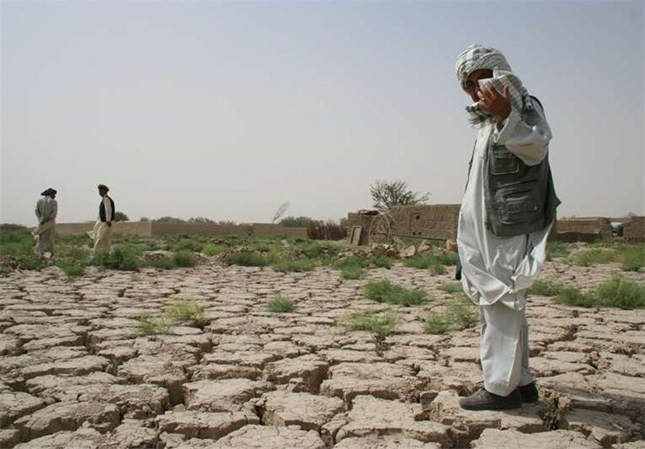As the water sources are heavily dependent on annual rainfall and snowfall but lack of snowfall in the winter season has intensified concerns over increase of droughts and climate change effects in Afghanistan. Officials from the National Environmental Protection Agency (NEPA) believe that Afghanistan has suffered enormously from the impact of climate change in the world and the level of the country’s underground water table has dropped considerably. As a result, lack of rain and snowfall this year threatens the grasslands and agriculture sector in the country. “We will lose our water resources if there is no rain and snow, also our agriculture sector will be harmed and this increases poverty,” said Malikyar, deputy chief of NEPA. Meanwhile, the Ministry of Agriculture Irrigation and Livestock (MAIL) informs of a stockpile of 240,000 tons of wheat in case of a drought in the next solar year.
There are several factors that strengthen droughts and also influence water quality such as climate change, agricultural activities, increasing population, types of water supplies, embedded technology in water management sector, wastage of water, quality of sanitation activities, storage of raw water in dry season, quality of canalization network. in relevance to population growth and decreasing agricultural lands, the authorities are responsible to undertake certain measures such as prevention of water losing in traditional agricultural sectors and urban water system network, changing the consumption patterns, regulated plans for drought combating.
But climate change factor we need to draw national and international attentions as it is beyond capability of solitary official unit. Each decade; Afghanistan has lost 2 percents of its rain and snowfall due to Climate Change. Study indicates that average temperature across Afghanistan has increased by 0.6°C since 1960. This general warming across Afghanistan is line with a pattern of rising temperatures across the region in which Afghanistan is located. On a local level, Kabul winters are now definitely not as cold as it was a few decades ago and its negative impacts are evident on both shallow and groundwater levels.
Consequently, thousands of wells have dried up while the number of population is increasing due to continued droughts, unemployment and security issues. The water table has dropped unprecedentedly, and thousands of settlements face sever water crisis. In addition, most of the shared water points and wells are contaminated, leading to illness. In Kabul city, with estimated population of 7 million people, 80% of them lack access to safe drinking water, and 95% lack access to improved sanitation facilities. Thus, other cities still do not have access to clean drinking water despite billions of dollars invested by the international community to help Afghan nation.
Overall, there is a unanimous concern that the level of rain and snowfall has significantly decreased compared to previous years posing serious harm to rained wheat crops in the country. Farmers say that the lack of rain and snowfall this year threatens the grasslands and agriculture. While Agricultural products form a core component of Afghanistan’s national economy. The country needs over six million tons of wheat every year from which, 4.5 million tones are produced inside the country and the remaining 1.5 million tons are imported from abroad. Recently, Toby Lanzer, the UN Humanitarian Coordinator for Afghanistan, has also raised concerns over a possible drought in Afghanistan next year, pledging the UN’s all out support to Afghanistan in case there is a wheat shortage in the country.
These follows several decades of steady droughts across Afghanistan’s northern, northeastern, central and western provinces could lead to a large-scale food crisis. According to Oxfam, nearly three million people are facing severe food shortages as a result of drought in 14 provinces out of 34 provinces. Eighty percent of the non-irrigated wheat crop, which people rely on for food and income, has been lost.”The issue is very serious. Every other year drought or other natural disaster puts millions of people into food insecurity,” Abdul Majeed Qarar, spokesman for the Agriculture, Irrigation and Livestock Ministry, said. Therefore, the government and humanitarian community should act quickly to ensure this does not degenerate into farther disasters. Delays will just make things harder for families already struggling to cope with chronic poverty.
Unfortunately, the very real threat of climate change and its deeply negative impacts on Afghanistan find no place in Afghanistan’s national and sub-national plans of development; not even at least in theory if not in action. If one looks at the Afghanistan’s National Development Strategy adopted in 2008, it makes no mention of climate change and provisions to tackle it on a long-term basis. But then again, Afghanistan’s National Development Strategy has largely been a failure so far; it has remained good only on paper with Afghanistan able to make no meaningful stride towards getting itself closer to achieving the plan’s vision.
Providing social security would be difficult to achieve without ensuring food security for the people of Afghanistan. It is hunger and unemployment that are partly responsible for driving the vicious cycle of war and conflicts in Afghanistan. It is imperative upon the government of Afghanistan to renew its commitment to moving forward and gradual implementation of Afghanistan National Development Strategy as the country’s second most important national document after the Constitution. However, National Unity Government has paid more attention to water infrastructure rather than previous government but within ANDS, the country’s agricultural sector must be given priority and climate change effect should not be neglected.
Home » Opinion » Afghanistan : Drought and climate change effects
Afghanistan : Drought and climate change effects
| Mohammad Zahir Akbari

